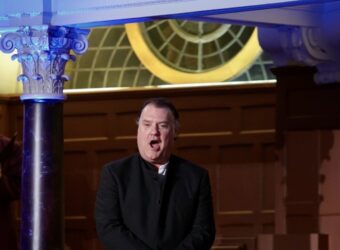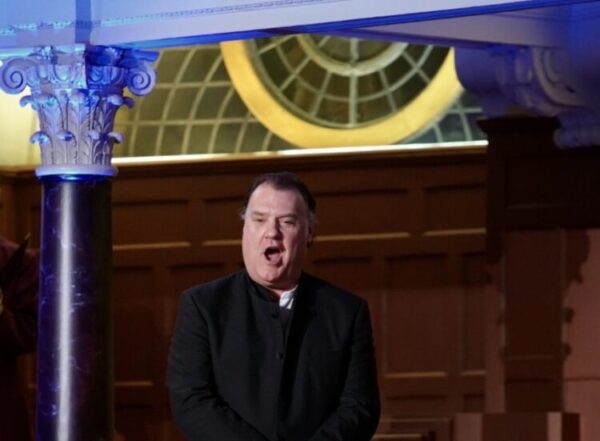 United Kingdom Wagner, R. Strauss, Toby Anderson: Sir Bryn Terfel (bass-baritone), Clara Dent (oboe), Oxford Philharmonic Orchestra / Marios Papadopoulos & John Traill (conductors). Sheldonian Theatre, Oxford, 5.5.2022. (CR)
United Kingdom Wagner, R. Strauss, Toby Anderson: Sir Bryn Terfel (bass-baritone), Clara Dent (oboe), Oxford Philharmonic Orchestra / Marios Papadopoulos & John Traill (conductors). Sheldonian Theatre, Oxford, 5.5.2022. (CR)

Toby Anderson – touchless: a disco
R Strauss – Oboe Concerto in D major
Wagner – Lohengrin: Prelude to Act III; Die Meistersinger: ‘Was duftet doch der Flieder’; Die Walküre: ‘Ride of the Valkyries; Wotan’s Farewell and Magic Fire Music
The two extracts or monologues from Wagner’s music dramas sung here by Sir Bryn Terfel both feature their central characters recognising the limitations of their power or influence, but also accepting – even excitedly anticipating – new regenerative forces that will succeed them. In both cases Terfel certainly expressed a resilient, assertive power that seemed not quite ready to let go yet, even if with a slightly rough, growling edge to the voice and a somewhat hollow core creeping into the more sustained notes.
In ‘Was duftet doch der Flieder’ he conveyed Hans Sachs’s almost childlike, innocent wonder that there are new things in the world that can still surprise and enchant him, with a questioning, somewhat urgent tone in the fairly short, clipped phrases Wagner writes. As Wotan, in the final scene of Die Walküre however, Terfel was more vociferous – on the one hand in acknowledging that he has to give up Brünnhilde to the first mortal man who will fearlessly encounter her, and on the other in calling upon Loge to create the flames that will surround her. For the later he theatrically moved from the main floor of the Sheldonian Theatre, up into one of the overhanging boxes in the intermediate tier, brandishing a spear in symbolic token of the god’s (waning) authority. In those extracts, as for the purely instrumental interludes between them – the Prelude which opens Act III of Lohengrin and the ‘Ride of the Valkyries’ at the equivalent point in Die Walküre – the Oxford Philharmonic Orchestra provided efficient support and instrumental colour, Marios Papadopoulos giving the music due weight without burdening it so as to lose momentum.
Richard Strauss’s Oboe Concerto stems from that glorious last period of his long life when, like those Wagnerian heroes, he was both resigned to the necessary end that will come when it will come (as Shakespeare puts it) but also looked back to his own creative past and that of his beloved Mozart to create new things. Papadopoulos’s interpretation tended towards carefully crafted languor rather than the alacrity of creative renewal, but the OPO were cheerful and not at all indulging in melancholy or introspection. Textures were lean and lucid, and some dynamic energy arose after the long sweep of the first section of the Allegro moderato, finally blossoming into something more typically Romantic and sighing with the riper chromaticisms of that first section in Strauss’s continuous score. Above all, however, Clara Dent gave a delectably vocal and sustained account of the solo part, which was never shrill or aggressive, but remained poised and dignified. The final Vivace sparkled with a tipsy effervescence.
The concert opened with the world premiere of Toby Andersons’s touchless: a disco, the winner of last year’s Composers’ Workshop, run by Oxford University’s Music Faculty for its student composers. The work was inspired by the ‘euphoric infinity’, as Anderson puts it, which the experience of a night at the disco can instil, but as tantalisingly perceived during the confinement of the Covid lockdown at the start of 2021. The piled up notes of the sustained chords for much of its duration recalled a more lucid version of the tonal clusters of Penderecki’s avant-garde style of the 1960s. John Traill’s conducting evoked well a grey (perhaps drug-fuelled) amorphousness, with eruptions of energy shooting through that intermittently by the violent taps of the timpani and bass drum. Euphoria maybe was also achieved with the occasional breakthrough to more recognisably tonal, triadic chords, but the effect of those sudden musical events among apparent formlessness was as much like the hangover on the morning after a rave, with the stabbing pains of a headache amidst the haze. In any case, it was a transfixing 10 minutes or so to open the programme.
Curtis Rogers
